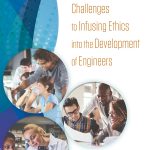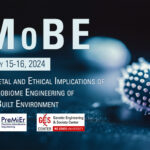
MoBE – Workshop on the Societal and Ethical Implications of Microbiome Engineering in Built Environments
This workshop is hosted by the GES Center at NC State and funded by the NSF Precision Microbiome Engineering (PreMiEr) research grant. Wednesday, May 15: Speakers to discuss the State of MoBE Science and Engineering; Social Equity; Bioethics; Risk Governance; Public Perception and Community Engagement; and Integration of SEI with Science and Engineering of the Microbiome [with public livestream] | Thursday, May 16: Presentation of case studies and deliberative discussions...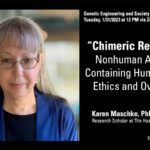
Karen Maschke – Nonhuman Animals Containing Human Cells: Ethics and Oversight | GES Colloquium, Spring 2023
This presentation focuses on ethical and oversight issues as they relate to the insertion of human cells into nonhuman animals, e.g., “chimeric research.” ...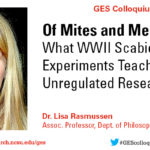
GES Colloquium | Lisa M. Rasmussen – What WWII Scabies Experiments Teach Us About Unregulated Research
GES Colloquium, 4/23/18 - Lisa Rasmussen | Of Mites and Men: What WWII Scabies Experiments Teach Us About Unregulated Research - The number of British soldiers suffering from scabies during WWII significantly affected the war effort. Consequently, the British military funded researcy to study the transmission and treatment of scabies. This colloquium looks at how the researcher interpreted ethical obligations to human subjects prior to modern codes and regulations, and what that can teach us about the ethics of new, unregulated forms of research. ...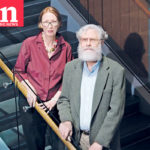
Gould quoted in C&EN: Building bioethics into the future of life sciences innovation
Scientists who refuse to engage with ethicists and the public will find themselves at a disadvantage. “Just because you are a scientist and have invented something doesn’t mean you have authority over it,” says Fred Gould, an entomologist and co-director of the Genetic Engineering & Society Center at North Carolina State University. He points to the National Academies report’s advocacy of participatory decision-making. Resistance from the science community based on ethicists and the public not fully understanding the science wears thin, he says. “You are a pretty poor scientist if you can’t explain what these things are about to an ethicist,” he says....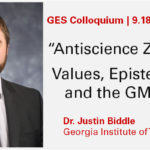
Justin Biddle – “Antiscience Zealotry?” Values, Epistemic Risk, and the GMO Debate
Justin B. Biddle is an Associate Professor in the School of Public Policy at the Georgia Institute of Technology. His research interests are interdisciplinary in nature, drawing on fields such as philosophy of science, technology, and medicine; bioethics; food studies; ethics of emerging technologies, and science and technology policy. Conceptually, his research explores the relationships between three sets of issues: (1) the role of values in science, technology, and medicine; (2) the epistemic implications of the social organization of research, and (3) ethics and policy. He has explored these relationships primarily in the areas of biomedical research and agricultural biotechnology. ...
Gene Drives and Responsible Innovation
It is not often that a new technology is at once hailed as a potential solution to pandemic disease, wildlife conservation and hunger, while also being feared as a potential military and environmental “bioweapon.” Gene drives,...
Jason Delborne appointed to National Academies Forest Biotech Study Committee
Dr. Jason Delborne has been appointed to the National Academies of Sciences provisional committee on The Potential for Biotechnology to Address Forest Health, or Forest Biotech Study. The study will be looking at the potential uses of biotechnology to mitigate threats to forest tree health, identify ecological, ethical, and societal implications of using this technology in forests, and develop an agenda to address knowledge gaps in its application. ...Continue reading "Jason Delborne appointed to National Academies Forest Biotech Study Committee"
Workshop: Ethics and Responsible Innovation in STEM
...Continue reading "Workshop: Ethics and Responsible Innovation in STEM"

Godwin and Delborne discuss CRISPR and ethics at NC Museum of Science
GES faculty John Godwin and Jason Delborne were at the NC Museum of History on 9.28.17 discussing genetic biocontrol of pest populations, such as CRISPR gene drives to eliminate invasive rodents from islands to protect endangered seabirds. See PowerPoint presentation & livestream video (including slides)....Continue reading "Godwin and Delborne discuss CRISPR and ethics at NC Museum of Science"
